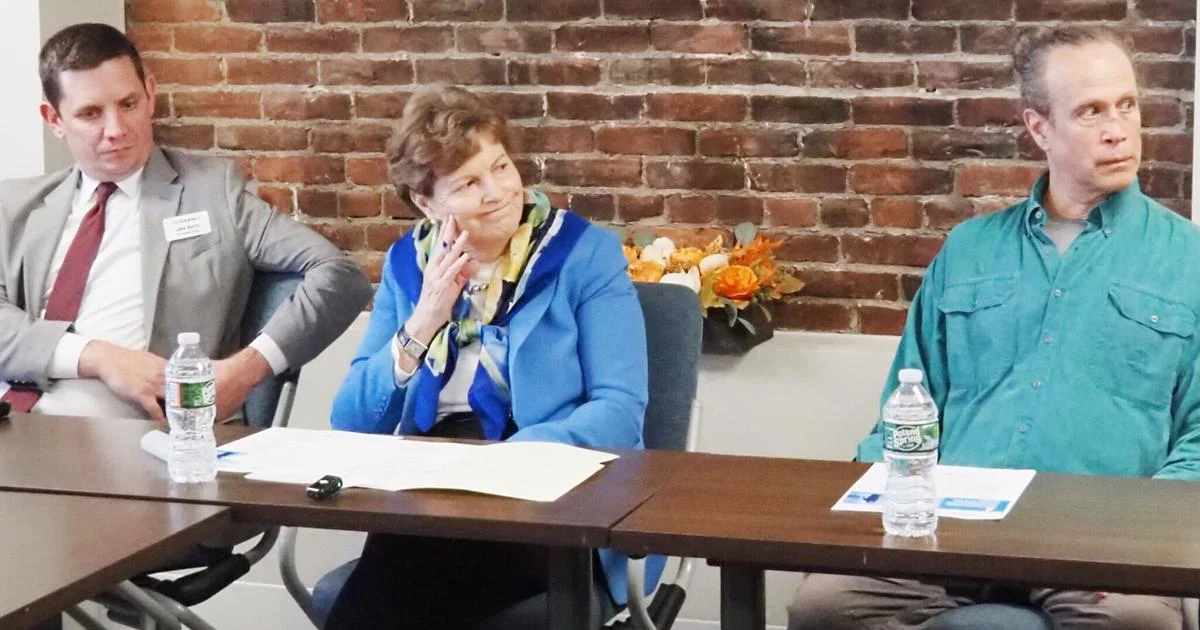Copyright keenesentinel

During a roundtable discussion in Concord Friday, Robyn Neville said she is “waiting for the shoe to drop” with her health insurance premiums. Neville is a cancer survivor and the former owner and operator of Room By Room Cleaning in Nashua. When the COVID-19 pandemic hit and caused major disruptions to the economy, her business began to fail. “I had basically no income coming in,” she said. However, thanks to the enhanced premium tax credits for the Affordable Care Act Marketplace, she was able to find a health insurance policy at an affordable rate. She’s been using the subsidy ever since to keep her premiums affordable. She said her premiums have increased since then as her finances improved and are now $730 a month, which is still a lot of money and difficult for her to cover. But she’s worried about what happens in December if Congress lets those tax credits expire. “At least I’m subsidized for the other half of it,” she said. “I can’t imagine having to foot the entire bill. So now, the main issue is I don’t know what they’re going to charge.” Today, the enhanced ACA tax credits have become the center of the current federal government shutdown fight. When Congress first established the enhanced tax credits — which were an upgraded version of a set of tax credits that were already available — in 2021, Democrats added an expiration date as a concession to get conservatives on board. That expiration date, which was subsequently extended by Congress, is now fast-approaching in December. That means if Congress doesn’t act and extend the expiration date again, Neville and roughly 50,000 other people in New Hampshire who use the credits will see their health insurance premiums rise. Senate Democrats, seeking to avoid that fate, made extending the tax credits a key priority in congressional budget negotiations. They refused to vote for any federal spending plan that doesn’t include an extension of this tax credit. However, Republicans never conceded, and without a spending plan in place the federal government ceased all nonessential operations Oct. 1. Democrats say they won’t vote to fund and reopen the government until Republicans agree to extend the tax credit, but Republicans say they won’t negotiate on the tax credit until the government reopens. Neville and several others met at a roundtable discussion Friday in Concord with U.S. Sen. Jeanne Shaheen, who has been at the center of backdoor negotiations in Congress, and urged Republicans to get on board and extend the tax credit. New Futures, a New Hampshire-based health policy advocacy organization, estimates if the credits expire, a single person in their mid-40s in New Hampshire who earns $31,300 a year could see their total annual premiums increase $1,344. However, the impact varies greatly based on income and demographic factors. For example, a New Hampshire couple in their 60s earning $90,000 a year could see their premiums increase $14,712, per New Futures. Sam Burgess, a health care policy coordinator at New Futures who was involved in making the estimates, said the impact is “staggering. “These subsidies are a lifeline for freelance workers, for small businesses, for our friends, our neighbors, and our loved ones,” Burgess said. Shaheen said there “are not any official negotiations going on” in Washington to extend the tax credits or end the shutdown, only backdoor conversations. Meanwhile, as the government remains closed, hundreds of thousands of federal employees are furloughed and many essential workers are working without pay. Additionally, social services like food or energy assistance benefits may not be disbursed, national parks are closed, and federally funded research projects could face delays. Shaheen noted that about half of adults using the marketplace are small-business owners, employees, or self-employed. She also argued the impacts would ripple across the entire health system as providers and insurers raise rates to account for the revenue lost when people can’t afford to pay for insurance or their medical bills. Neville wasn’t the only cancer survivor to advocate for the extension of the tax credits. Morgan Leininger, of Concord, said he would be dead if not for the Affordable Care Act. The health coverage he received through the ACA allowed him to undergo surgery to remove a walnut-sized tumor millimeters from his brain. The ACA, in addition to creating the marketplace where the tax credits are applied, forbade health insurers from denying coverage to or increasing premiums for people with preexisting conditions. While Leininger’s surgery was performed before the tax credits were increased, he said the ACA’s other provisions are the reason he had health insurance to begin with. He is now cancer-free and using the increased tax credit to keep his coverage, which pays for the lingering health impacts. “I am considered cured,” Leininger said. “However, the 42 days of radiation has left me without a septum, and so my access to health care is absolutely critical for me and is critical to my family.”



